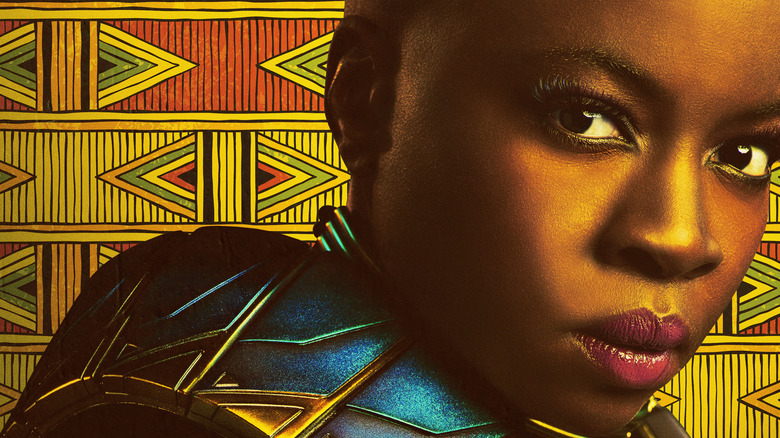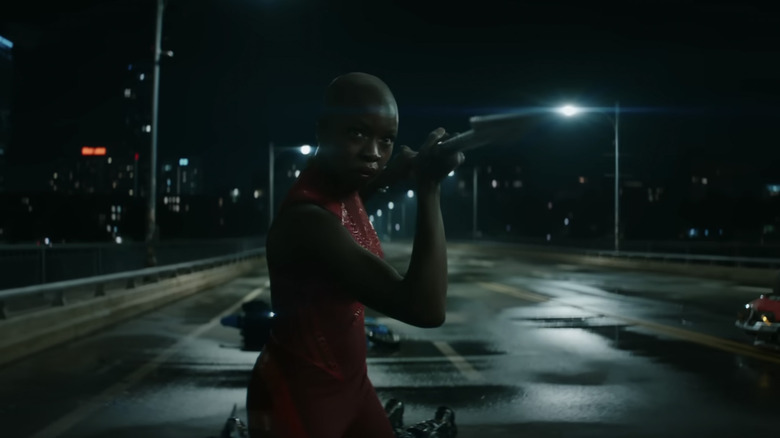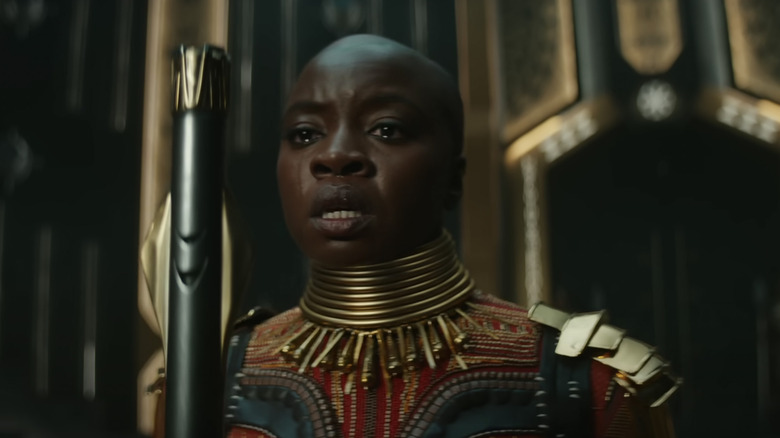Danai Gurira Talks Okoye's Big Wakanda Forever Moments, Including That Bridge Fight [Exclusive Interview]
Warning: This interview contains mild spoilers for "Black Panther: Wakanda Forever."
All the characters in "Black Panther: Wakanda Forever" go through a journey during the movie's 161-minute run time. Okoye, played wonderfully by Danai Gurira, is no exception, and she finds herself in a very different place at the end of the film.
I had the chance to talk with Gurira about some of Okoye's major moments in "Wakanda Forever." Read on for that discussion, where we discuss some of her major fight scenes and that big emotion moment she has with Angela Bassett's Queen Ramonda.
'I need you to just give me a corner, a mat, and my trainer, and I'm good'
This interview has been lightly edited for clarity and brevity.
Okoye has a really big journey in the film, including getting a new suit. What was it like performing in that suit, and did you give any feedback or input on what it looked like?
I actually had no input on what it looked like. How she ends up with that suit is very much a journey of a lot of shifts and changes for her, but there's an aspect of her journey, her grieving and her shifting as a result of what happens in the film, that causes her to end up where she ends up with the suit. [The suit] is a very different experience altogether, but it also represents a shift for her that, whether or not she wanted it, that's who she is now.
You also have some really impressive fighting scenes in the movie. I'm thinking specifically of the sequence in Boston on the bridge over the Charles River. Can you talk a little bit about how you prepared for that and how you prepared to act against seeing an orca and a blue whale jumping up in front of you?
It was very arduously intense to learn that fight. I also incurred some little injuries here and there, so I was dealing with physical therapy. But funnily, PT after an injury can make you stronger in an area than you were before — so it was a very interesting physical journey to get to the point where those fights were in my body. And then I got really maniacal about it. I was wanting to train all the time and I was pushing to get trained and they're like, "We're not training until Thursday." I was like, "No, no, no — I'm coming in tomorrow, which is Tuesday, and I need you to just give me a corner, a mat, and my trainer, and I'm good."
So I was kind of that person who was a little all over it all the time, because I just really wanted to get to the point where it wasn't a thought and I wasn't thinking when I was doing it. That's where you have to get to by the day. And that requires so much drilling, and so much work, and so much connection to the psychology behind what you're doing in the scene. Eventually, when the film comes out, I'll release some ... there is tape on my phone — I record on my phone every single rehearsal, because then I'd go home and study it, show it to my trainer, and deal with my form. So I'm just going to release some of those videos.
'It was very clear to us and very uncomfortable, even as actors'
That's awesome! You also have an intensely emotional scene with the queen when Shuri gets taken by Namor. How did you prepare for such an emotional scene like that and what was it like on the day, shooting that scene?
I mean, we discussed it so much. We'd been looking into it so much. [Director Ryan Coogler], and I, and Angela [Bassett] talked about the scene so often, and Ryan did some work on it and then handed it back to us pretty close to shooting it. But we had been in it so much in terms of what we knew the scene needed to be, and we would debate what it needed to be in all these different ways. So we were very clear about what it was, and what it was for each person.
There's something, of course, very devastating about that because of their connection and how she sees her as a mother figure, her connection to this family, and of course, the issue that they're dealing with and the failing they're in.
So there's a lot — and of course, a big part of Okoye is that she doesn't fail. So to experience something that is clearly a failing is also something that compounded the emotion of the moment. And of course the idea of Shuri's importance to them, to her heart. There's just a lot going on in there that we spent a lot of time discussing.
But we all also understood the assignment. It was very clear to us and very uncomfortable, even as actors. It's not fun, even as actors, to come for that. And the other beautiful thing about all these amazing people is that we all are really there for each other. So it didn't matter if the camera was on Angela or it was on me, we were just giving each other the exact same scene back to back, to back, to back. I think it might be because we're all from theater. But maybe not. Theater's not always the reason, but in our case it might be. But then you're just locked into something. The camera can do what it needs to, but you're just locked into something.
"Black Panther: Wakanda Forever" is now playing in theaters.


